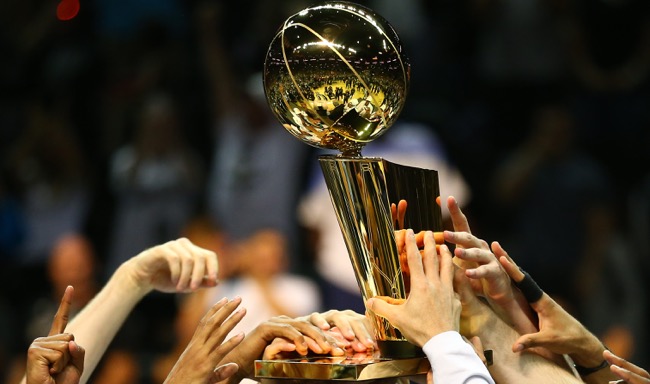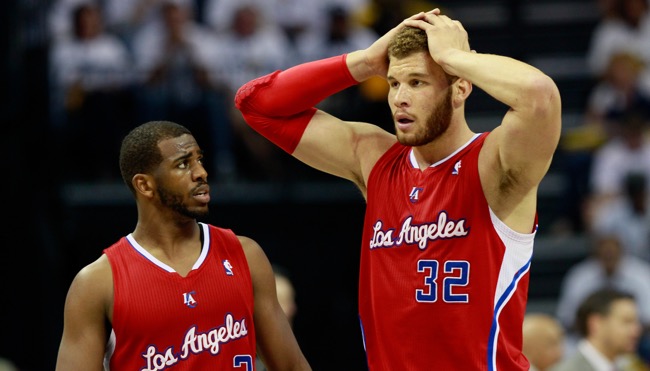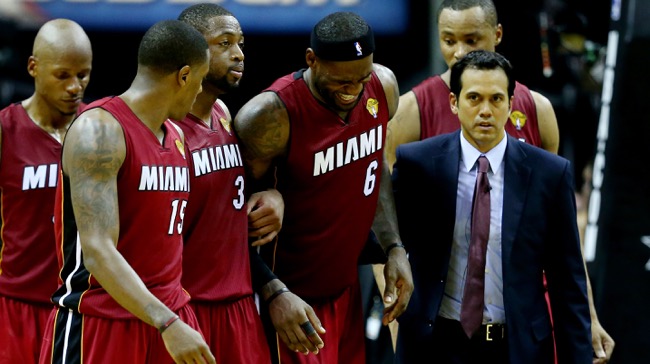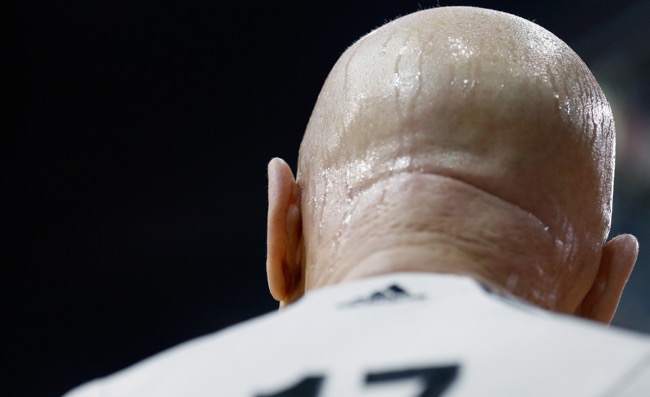
The NBA Playoffs have arrived, and now we get to listen to talking heads, volume Tweeters and national columnists jerk the NBA-watching public around with horse-race journalism after every night of action. This is OK: it’s what the public wants and giving the masses what they want pays the bills. But there are a few fallacies that pop up every time the postseason rolls around, and these same NBA tastemakers routinely forget they’re buying into a worn-out narrative, one that doesn’t really hold up to even cursory scrutiny.
It’s not that some of these postulations are out-and-out wrong, but they’re either misunderstood, or the majority of them follow the hivemind mentality Twitter has enhanced and rewarded. Let’s get into the meat of these inferences, either striking them down or amending them one at a time.
A 2-0 Series Lead for the Home Team Doesn’t Forecast a Victory In The Series

People, and even some short-sighted analysts who have fallen in love with their own opinions on Twitter, can get caught up in the momentum a 2-0 series lead usually engenders. Right now seven of the eight first-round contests are at 2-0. But when the higher seed successfully defends their home court, that’s all they’ve done. Even with this caveat in place, when an NBA team with home-court advantage has a 2-0 lead in a best-of-seven series, they win that series 94.4 percent of the time, according to WhoWins™, which tracks the postseason odds of advancing throughout all professional sports.
Even with that 94.4 percent expectation of a victory, the home team is usually favored anyway and they’ve successfully defended home court — at least in the first two games. We’re surprised it’s not a higher percentage, really. Still, with so many teams up 2-0 going on to win the series, they’re just doing what they’re supposed to: defending their home floor in the playoffs. That’s why teams bust their humps over the course of a protracted regular season, one that’s probably a third too long.
Acquiring a home-court advantage is huge, but the series doesn’t start until someone wins on the road (another playoff trope that’s actually true). If the opposing team comes back and wins Game 3, which happens almost 60 percent of the time (via WhoWins) because — again, home team — then it’s a series all of a sudden. Have no fear, Bucks, Celtics, Nets, Mavs, Pelicans and Blazers fans. Raptors fans should probably worry since they blew their first two games at home.
(Ed Note: this was written before Thursday night’s trio of playoff games)
Only 11 NBA teams have come back from a 2-0 hole (we’re counting teams without home-court advantage, too) since the Blazers did it in the 1977 Finals (RIP Dr. Jack). All of them happened in the last 25 years, and perhaps that’s why it’s become such a common refrain in the media — the old standbys likely gained full basketball sentience in the 1980s — when no one came back from an 0-2 deficit.
Here are the 11 teams who have come back, just in case someone asks you about them at the bar:
-Bulls (vs. Knicks) 1993 Eastern Conference Finals
-Rockets (vs. Suns) 1994 Western Conference Semifinals
-Rockets (vs. Suns) 1995 Western Conference Semifinals
-Lakers (vs. Spurs) 2004 Western Conference Semifinals
-Mavericks (vs. Rockets) 2005 Western Conference First Round
-Wizards (vs. Bulls) 2005 Eastern Conference First Round
-Heat (vs. Mavericks) 2006 Finals
-Jazz (vs. Rockets) 2007 Western Conference First Round
-Cavaliers (vs. Pistons) 2007 Eastern Conference Finals
-Spurs (vs. New Orleans then-Hornets) 2008 Western Conference Semifinals
-Thunder (vs. Spurs) 2012 Western Conference Finals
That last one you probably remember. Every pundit on the planet had handed the 2012 NBA Champion to the Spurs, with LeBron having still not answered questions about his cool under pressure and the Spurs having won their last 10 games of the regular season and the first 10 games of the postseason. OKC lost the first two in San Antonio, affirming that widespread stance. But then something not quite as crazy it seemed happened: the Thunder took the next four straight to win the Conference crown. Everyone was wrong.
The Best Player’s Team Does Not Always Win
There are plenty of examples for this, but let’s look at why it always seems to come up. The popular consensus — one only the 2004 Pistons and 2014 Spurs really rebuked, and both of those teams will have players enshrined in the Hall of Fame — is that you need a superstar to win an NBA title. The foundation for this is not in doubt: heightened playoff defenses call for more exceptional individual offensive performances the further a team goes in the playoffs. But the best player isn’t necessarily on the best team.
LeBron James was the best player on the floor during the 2014 NBA Finals. For some reason, people look at Kawhi Leonard’s Finals MVP award and forget that LeBron had another incredible series (the same could be said for his series in 2009 when the Magic knocked off his favorited Cavs 4-2, even though James averaged 38.5 points, 8.3 rebounds, 8.0 assists, 1.2 steals and 1.2 blocks in over 44 minutes a night)
Chew on this for a bit:
#NBAFinals PER:
1. LeBron: 32.2
2. Mills: 25.0
3. Kawhi: 24.0
4. Green: 24.0
5. Duncan: 19.8
Stats: http://t.co/Ph4SfYyutY— RealGM (@RealGM) June 16, 2014
Yeah, James had a more efficient ’14 Finals than Leonard, or anyone else on the Spurs. The difference? San Antonio’s superior shooting and spacing led the day, and it was an absolute demolition of a Heat team who had just won the Eastern Conference for the fourth year in a row. The best player usually wins, but that’s not always the case.
Jump Shooting Teams Can, And Have, Won It All
The 2011 Mavericks were a jump shooting team; the 2013 Heat were a jump shooting team. Both were in the top-6 for three-point attempts that season. More and more teams are relying on the long ball to produce necessary points within their offensive schemes. Anyone who claims the Rockets can’t win the 2015 NBA Finals because they shoot a lot of three-pointers must not realize the Warriors, Clippers and Cavs all rank within the top five three-point attempts this season.
Yet Charles Barkley and Kenny Smith pointedly decry a lack of toughness down low for teams (like the Warriors and Rockets) who take — and make — a lot of three-pointers. They’re forgetting that a healthy Dwight and a healthy Bogut/Green seem to negate that argument, but the Hawks rank No. 7 in three-point attempts and the Cavs No. 2; Houston and Golden State, the top seeds in the West, rank at Nos. 1 and 4, respectively. What Kenny and Chuck both fail to realize is the Spurs run specific actions to get their spot-up shooters open looks in the corners. Every title contender relies on the long-ball. Every one. If you don’t, you can join Byron Scott and shoot as many college three-pointers (the most inefficient shot in the NBA) as you want.
Putting the ball in the bucket wins games. Just because these teams aren’t always getting open layups, or pounding the ball on the block, doesn’t necessarily mean they’re going to lose. Jump shots are important, and shooters are important for any title team. Yes, you’d like a mix of both paint touches, easy looks in transition AND three-pointers, but the jump shooting argument is already empty. Jump-shooting teams have already won the title. In fact, in today’s NBA, where the three-point line is more valued than it’s ever been, you better be able to knock down the triplet if you’re going to have any chance of moving on.
Coaches Are Almost As Integral As The Players

It’s a common misconception the best coaches win championships, when it’s usually a combination of both great players and a coach who knows how to use those players. Erik Spoelstra probably doesn’t get enough credit for the job he did leading the Miami Heat to four consecutive Eastern Conference Titles and back-to-back NBA Championships.
Likewise, sometimes we give Gregg Popovich too much credit for a Spurs team with three future Hall-of-Fame players and a GM – R.C. Buford – that’s one of the sharpest guys around the Association. Yes, we’re prone to crediting Popovich with just about every Spurs win, and he is the best in the Association these days, but his players have to actually go out and execute, and no amount of game planning accounts for Kawhi’s preternatural hands, Manu’s third eye for the folds in the defense, Tony Parker’s body control (when he’s healthy), or Tim Duncan’s stoic brilliance on the block. Pop’s certainly the best candidate to get the most out of those talents, but blaming a coach for a team’s ills in the playoffs is ignoring the actual players.
Yes, coaching is more important in the postseason than in the regular season because of all the game-to-game and in-game adjustments they’re forced to make to counter the opposing coach. Yes, the properly laid back instruction at just the right time in a tense playoff game can sometimes be the difference between a win and a loss. But it’s never the only difference.
That Rigging Ref Conspiracy Exists Only In Your Mind

In the wake of the Tim Donaghy scandal, or the public’s misunderstanding of the traveling rule, or the difference between a block and a charge, the public distrust of NBA officials has remained pretty high over the last decade. Donaghy, especially after serving his 13-month stint at the Hernando County (Fla.) Jail, has done his best to usurp any notion of fair play in the Association while constantly claiming more than a few playoff games – like the Lakers-Blazers Game 7 in 2000 – were fixed.
There are prime examples, obviously, and Donaghy himself plays a role in most of them. The 2006 Finals –a series where the home team led 2-0 only to fall in the end, by the way – featured more than a couple eyebrow-raising whistles, specifically most every time Dwyane Wade drove to the cup in Game 5.
The year after that, the Suns and Spurs met in the second round even though they both were legitimate title contenders that season. Bill Simmons, for ESPN’s Page 2, wrote about the injustice of the officiating in that series, specifically Game 3, where Donaghy was one of the officials.
But it’s not just Donaghy. The overwhelming perception, even among smart basketball fans, is the NBA is fixed. Most believe the league is in cahoots with the refs about this, and they’re actively trying to see certain teams – the Cavs, the Bulls, the Rockets [insert large-market team, or a team with a superstar here] advance because more people will watch those teams than the Spurs or the Grizzlies. Remember, the new TV-rights deal acts as much bigger money for owners than gate receipts.
But if you really think there’s a mass conspiracy to elongate a series, and thus augment the viewership and driving up the value of a franchise over time, then you’re drinking the hivemind’s kool-aid. The idea of the refs rigging a game, or a series has been around for a while, but it reached an apex right after Donaghy’s infractions saw the light of day and then again when his book came out. Deadspin offered up unreleased snippets that fueled the fire. Most people weren’t surprised.
Simmons wasn’t the only who made it seem like there was something fishy about the NBA’s officiating over the years, and that opinion has already bled into the current game and contemporary fans. Twitter gives fans the perfect outlet to voice their disdain and join others in their outrage. The popular maxim after a loss: ‘the refs screwed us,’ is just as popular as it’s ever been, but now you can actually see the online anger in real time.
Evan Turner wasn’t pleased with the calls at the end of Game 2 on Tuesday night, and Mark Cuban, a long-suffering ref basher, was at it again last month. Working the refs is a full time job.
Superstar calls, flopping, and any of the other vitriol you see during a game online always ties back to the credibility of the zebras – and mostly that they just don’t have any. People will still make WWE jokes about the NBA on DIME’s Facebook timeline no matter how the referees perform.
They can’t win because there’s no way to prove they’re doing a good, impartial job. So fans, writers, analysts, and whoever else is upset with a call, concoct a conspiracy in their mind that aligns with the call they think was botched. Maybe we’re naive, but we think the best team wins the NBA Championship, and any blown calls are just that: a mistake, nothing more or less.
No One Definitively Knows Who Is Going To Win The 2015 NBA Finals
A couple weeks ago, a friend of mine asked me who would win the NBA Title this year. My response: “Right now I think the Spurs might do it.” I* even emphasized my uncertainty. That’s because I don’t know who will win the 2015 NBA Finals, and neither do you. No one does. Sure, I can make an educated guess from watching film, analyzing statistics, historical precedence and other factors, but at the end of the day, teams still have to play one another, and one of them — and only one — will end up winning their final game. No one in the entire known universe knows who this is going to be, which is why we all watch!
The Golden State Warriors may win the 2015 NBA Finals. I predicted it, and while I’ve probably watched a tipping point amount of basketball in my life, and certainly enough to make a pretty nuanced guess, it’s still just a guess –the same as my Mom, who doesn’t watch hoops. I don’t know who will win with a 100 percent degree of certainty. Neither does any writer claiming otherwise, and neither do you.
So when someone writes that the Golden State Warriors Are Going To Win The NBA Finals, their surety is a guise. They think the Golden State Warriors will win the NBA Finals, but like everyone — they don’t really know. It’s a nice narrative technique editors tell their writers in order to own their topic and stand firm with their opinion. But it has no basis in reality.
The Golden State Warriors could possibly win the 2015 NBA Title, but I don’t know that for a fact – and neither does anyone else.
*had to break away from the editorial we on this one.






